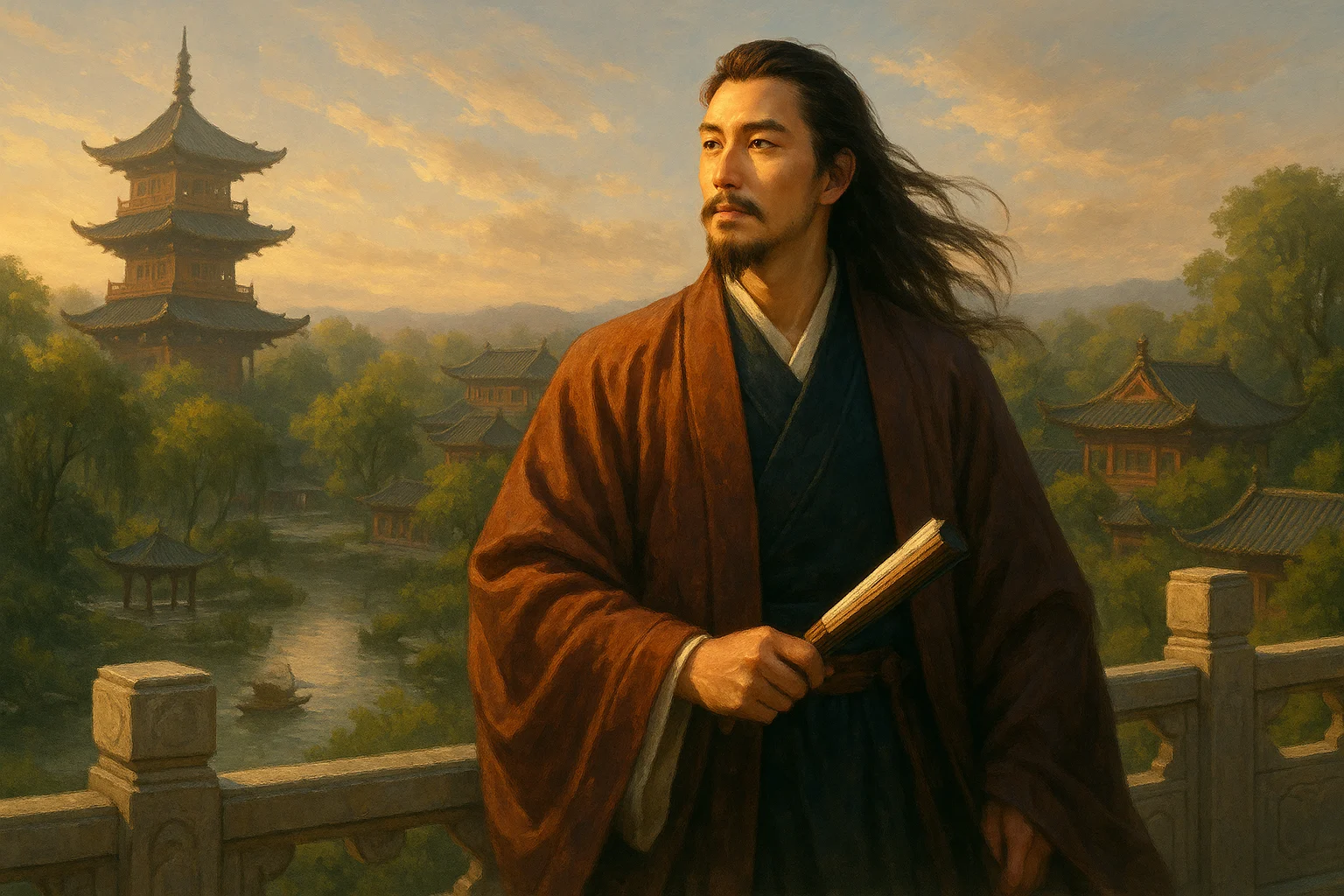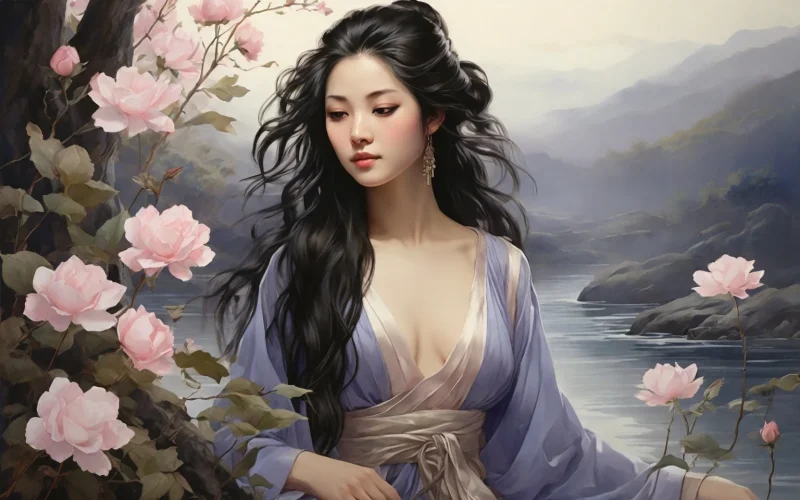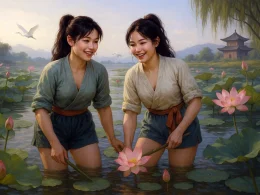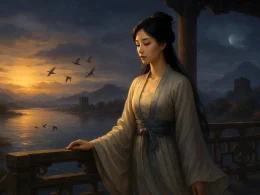Paddy fields stash jade-green floods,
Pine boughs shake off mud's last bloods.
Limping up slopes to my lone bed—
Noon crows peck dreams half-dead.
Original Poem
「归庵」
王安石
稻畦藏水绿秧齐,松鬣初乾尚有泥。
纵蹇寻冈归独卧,东庵残梦午时鸡。
Interpretation
This poem was composed during Wang Anshi's retreat to Zhongshan after resigning as chancellor. Residing in Jiangning (modern Nanjing), he devoted himself to reading and self-cultivation at the Eastern Hermitage, embracing a life of simplicity amidst mountain forests. Capturing scenes and reflections during his return to the hermitage, the poem depicts rural summer landscapes at farming season, interweaving the tranquility of his retired life into a serene and far-reaching recluse's tableau.
First Couplet: "稻畦藏水绿秧齐,松鬣初乾尚有泥。"
Dào qí cáng shuǐ lǜ yāng qí, sōng liè chū gān shàng yǒu ní.
Paddy fields hoard water—green shoots stand aligned;
pine roots, freshly dried, still cling with mud.
This couplet sketches early summer’s rural vignettes. Returning to his hermitage, the poet observes the orderly rows of young rice shoots, their verdant vitality mirrored in the water’s sheen. "Pine roots" (松鬣), the fibrous tendrils at a pine’s base, "cling with mud" (尚有泥), suggesting recent rain and lingering dampness—a quiet dynamism beneath the surface stillness, where nature’s pulse thrums unseen.
Second Couplet: "纵蹇寻冈归独卧,东庵残梦午时鸡。"
Zòng jiǎn xún gāng guī dú wò, dōng ān cán mèng wǔ shí jī.
Limping uphill, I seek my solitary couch;
at noon, a cockcrow fragments dreams in Eastern Hermitage.
Transitioning from external scenery to inner reflection, the couplet reveals the recluse’s resolute solitude. "Limping uphill" (纵蹇寻冈) portrays physical frailty yet unwavering commitment to retreat; "solitary couch" (独卧) underscores his embrace of austere solitude. The "cockcrow" (午时鸡) at high noon—an hour of stillness—shatters lingering dreams, blending the mundane (farm sounds) with the ethereal (dream fragments). This interplay of sound and silence, wakefulness and slumber, mirrors the poet’s liminal state between worldly detachment and spiritual awakening.
Holistic Appreciation
In four sparse lines, the poem distills the essence of reclusive life—its hushed beauty, natural rhythms, and inner tranquility. The opening couplet paints agricultural and sylvan details: rice shoots, pooled water, pine roots, and damp earth compose a living landscape. The latter couplet turns inward, where "limping," "solitary," and "fragmented dreams" reveal physical decline countered by spiritual steadfastness.
The motifs of "return" (归) and "dream" (梦) intertwine, merging reality and reverie; "water-hoarding fields" and "dream-shattering cockcrow" echo across the poem, binding movement and stillness. Here, pastoral freshness meets philosophical detachment, reflecting the poet’s late-year pursuit of serenity and unadorned truth.
Artistic Merits
- Scene-embedded emotion, stillness-in-motion
Vivid depictions of mud-clung roots and waterlogged fields pulse with latent vitality, tracing time’s passage and nature’s quiet resurgence. - Brevity with depth, restrained artistry
"Fragmented dreams at noon cockcrow" (东庵残梦午时鸡) condenses liminal consciousness into a single line, blurring dream and reality, silence and sound, with resonant economy. - Unadorned language, natural imagery
Rice, pines, mud, and chickens—ordinary elements—combine into a vibrant early summer portrait, celebrating simplicity’s poetic potential. - Scene-self fusion, classical elegance
Landscape and psyche merge seamlessly; the hermitage path, noon interlude, and farm sounds coalesce into a unified vision, plain yet profound.
Insights
This work constructs a meditative portrait of reclusive harmony through minimalist strokes. It whispers that home is where the mind finds peace—physical impediments ("limping") cannot constrain spiritual freedom. Even in humble paddies and hermitage shadows, one may touch life’s transcendent ease. True living demands not grandeur but authentic stillness, a lesson echoing across nine centuries: contentment blooms where attention rests on the ordinary, and grace dwells in the unhurried gaze.
About the Poet

Wang Anshi (王安石 1021 - 1086), a native of Linchuan in Jiangxi, was an outstanding statesman, writer, and thinker of the Northern Song Dynasty, counted among the "Eight Great Prose Masters of the Tang and Song Dynasties." His poetic achievements were particularly profound—his early works, filled with heroic language, revealed the ambition of a reformer. Though his ci poetry was few in number, it pioneered new realms of historical reflection. His poetry and prose combined intellectual depth with artistic value, and the over 1,500 works preserved in The Collected Works of Linchuan stand as a monumental testament to literary innovation in Song Dynasty literature.












